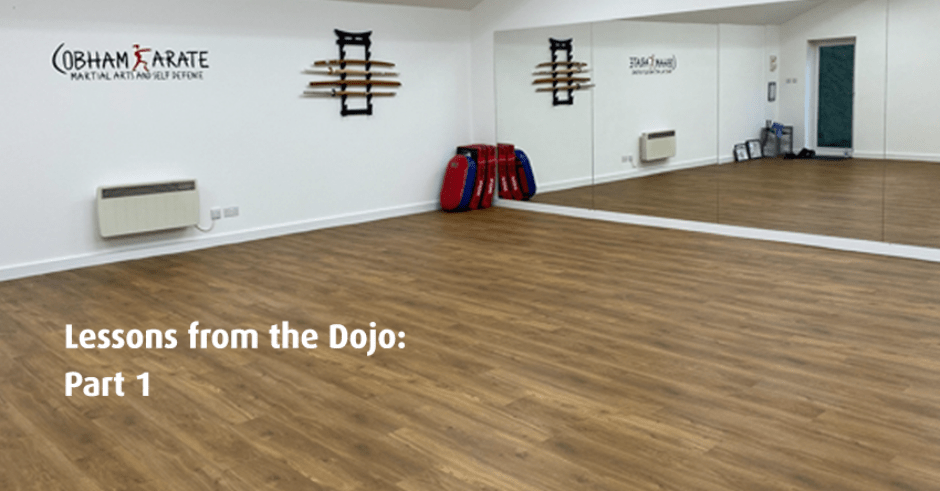A lifetime practitioner of martial arts it has for many years been a dream of mine to have my own dojo. As that dream has for the first time been fulfilled my martial arts journey enters a new phase. As it does I have started to reflect on what I have learnt from all my instructors past and present and how so many of these lessons apply to life in general and leadership specifically.
Firstly it’s important to say that I practice martial arts not to be able to fight but to be able to avoid fights or violence. And so far I have done so. Martial arts properly studied is about the following:
– Perseverance and hard work
– Mental and physical discipline
– Respect and Humility
– Lifelong learning and Coaching
As I study leadership as a profession, I have started to see the parallels between the modern demands on leaders and the teachings of martial arts. I will look at each in a series of essays. In this article, I will look at lifelong learning.
Increasingly Leadership and Learning professionals alike have been talking about lifelong learning, recognising the importance of continuous learning whilst at the same time recognising that most learning takes place outside of a classroom. It is the only sensible way for leaders to remain current in a world-changing so rapidly. But masters of martial arts have known the importance of lifelong learning for hundreds of years.
In most if not all martial arts there is no endpoint. Even the grandmasters continue to learn and perfect their art. Learning not only from other masters but also, for example, their students. Many might be under the misconception that when you have reached “black belt” that you have attained the ultimate knowledge and ability of that particular style. But those in the know will tell you that your learning journey only really starts with the attainment of your black belt. One of the essential ingredients for true lifelong learning is of course humility but I will write about that next. But it is only when you assume you know enough or have nothing to learn that your learning stops. You then stagnate whilst the world continues to move on, meaning that in real terms you fall behind. Leaders often feel the pressure “to know the answer”. And historically they probably did because they had done all the jobs which they now supervised. Increasingly however this will not be the case. Leaders have to be able to admit that they don’t know and that that is OK. Then they will be open to learning. Including learning from those that “report” to them”.
Wikipedia says Lifelong learning is the “ongoing, voluntary, and self-motivated” pursuit of knowledge for either personal or professional reasons. Therefore, it not only enhances social inclusion, active citizenship, and personal development, but also self-sustainability, as well as competitiveness and employability
The CBI says “The Fourth Industrial Revolution is changing the world of work at a rapid pace and driving up the level of skills required. But this picture is complicated further by declining levels of adult participation in learning precisely at the time it needs to be going up. The UK skills situation is made more challenging by a ‘missing middle’ in education, a skills gap that businesses can ill afford and a key blocker to worker progression. Reacting to change, businesses are committed to training and developing their workforces, but the delivery is a more complicated picture. Apprenticeship routes are growing, but many firms still have a heavy reliance on informal training and on-the-job development. A new era of partnership between business, government, and employees offers opportunity.”
But I personally think that too many employees don’t see the critical importance of continuing their development and too many line managers/leaders, do not view coaching and the development of their people as core to their role. As organisations have to become increasingly adaptive and nimble this will have to change.
The martial art practitioner knows that their learning will never be complete. That there is always room for improvement and always something new to learn. In fact, it is a fundamental premise of martial arts that continuous improvement and ongoing learning are integral to the art. This learning is undertaken through a mixture of instruction, coaching and practice. And practice also has a number of distinct components (practice in front of your sensei, practice in front of a mirror where you self correct, practice on an impact bag, practice with a fellow student, all for a single technique). Feedback is also integral to this learning process. And this feedback is not saved until the end or after the class, its given, in a coaching format, live, real-time as the student is practising. Organisations are now realising that the annual performance management process is often destructive and that ongoing developmental feedback is far more productive. Annual ratings are either being replaced or more commonly augmented by a culture of ongoing regular developmental conversations.
The development process often looks like a cycle. The Sensei will develop a new technique. The Sensei practices and refines this as he teaches his students. He teaches them by telling them, showing them, allowing them to practice, giving them feedback and allowing the students to learn together. As his students learn the Sensei’s understanding of the technique deepens. This allows him to develop even more techniques. There is if you will a cycle. (where he =he/she)
Therefore whilst leaders need to do more real-time coaching, they also have to be secure and open enough to learn from a variety of sources, including those who work for them. Mutual Humility and Respect are therefore an essential ingredient to life long learning and continuous improvement.
Andrew Fox


